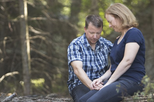With the addiction epidemic on the rise, many husbands and wives are finding themselves with significant others who have addictions. Some of them may have had clues that their spouses had ongoing addiction issues and were determined to help them recover. Others may have a spouse whose addictions developed during marriage. Nonetheless, these situations lure the non-addicted spouses to a special kind of opiate—an overbearing amount of hope.
Can You Love Your Addicted Spouse to Recovery?
Meet “Melissa,” a certified peer specialist for people struggling with addiction and a former wife of an addict. For many years, she comforted people at work and came home to a husband—a supposed recovered addict—who hid an ongoing addiction. Melissa said on his best days, her then-husband "said the right things and did all the right things.”
Even with her professional experience, it took some time to realize that he had returned to using. “If he would be tempted to use money for drugs, he would give it back to me and apologize,” she explained. “He'd say he was going to use it for drugs, but didn't because he didn't want to disappoint me. Looking back, now I think he only came to me because he was afraid he was going to get caught."
The two met when he entered recovery. Melissa said, “I was OK with that because why should somebody not get another chance? Everybody deserves that in my opinion.” Melissa saw him through the steps of recovery and believed he had made good on his commitment. Eventually, they married. Over time, however, her husband returned to his addiction and, despite everything she knew as a professional, she had become a codependent who had loved another human at the expense of loving herself.
3 Lessons to Learn
Melissa’s story is not unique. Like most people who make it down the aisle, she hoped for her marriage to succeed. Her love and commitment to her vows, combined with a desire to help those with addiction, perfectly entrapped her into the nook that is codependency. Now, Melissa shares her three tips on things she would have done a little differently so you, too, may find your way back to prioritizing yourself.
1. Don't enable.
"I always said, ’What can I do to help you?'” Melissa confesses. “That was the worst thing I could have ever said.”
Before loving anyone, you have to learn to love yourself. This means going through your baggage and understanding why you feel the impulse to help someone even when it isn't good for you. Loving yourself, and the other person, requires self-control. Actions shouldn't be done compulsively to earn someone's approval, love, or to fix something. Mature love requires self-control as a tool to support your spouse emotionally without compromising your own safety, security, or emotional well-being.
2. Know your boundaries.
Establishing your own boundaries is crucial for any relationship. You are responsible for your own emotions which means you have to protect your heart. Identify actions, words, and circumstances that make you feel uncomfortable to help you set your limits. Commit to loving yourself first by honoring these boundaries and making an action plan to guard yourself when they are overstepped by your partner.
You may start by expressing to your partner what you do and don't feel comfortable with—then tell them the repercussions. For example, in the case of money going missing, you can say, “Please, understand that I love you, but I also need to love myself. If you aren't honest with me about the money, I will need to stop giving you access to the account because your habit is hurting me, too.”
Remember, you set boundaries not to hold grudges or punish anyone, but to protect yourself from overstepping your limits while allowing the other person to make his or her own choices. At any point the relationship becomes a one-way street, have a plan and stick to it. This is how you walk responsibly in love and respect, both towards yourself and your partner.
3. Seek support when you need it.
While feelings of embarrassment or shame may be present, they shouldn't hold you back from getting support when you need it. Surround yourself with loyal and affirmative people who are experiencing the same thing to help encourage you. Draw strength from couples who have endured similar circumstances or groups who can comfort you while holding you accountable to loving yourself first.
In codependency, we believe we are responsible for our spouse's emotions and well-being. But in reality, the only person you are ever responsible for is yourself. As you shift from an enabling role to a supporting one, it is possible that you may feel false guilt and confused. Don’t hesitate to seek help as you sift through these complex feelings.
If you or someone you know is seeking help from addiction, please visit our directory of treatment centers or call 800-772-8219 to talk to a treatment specialist.








